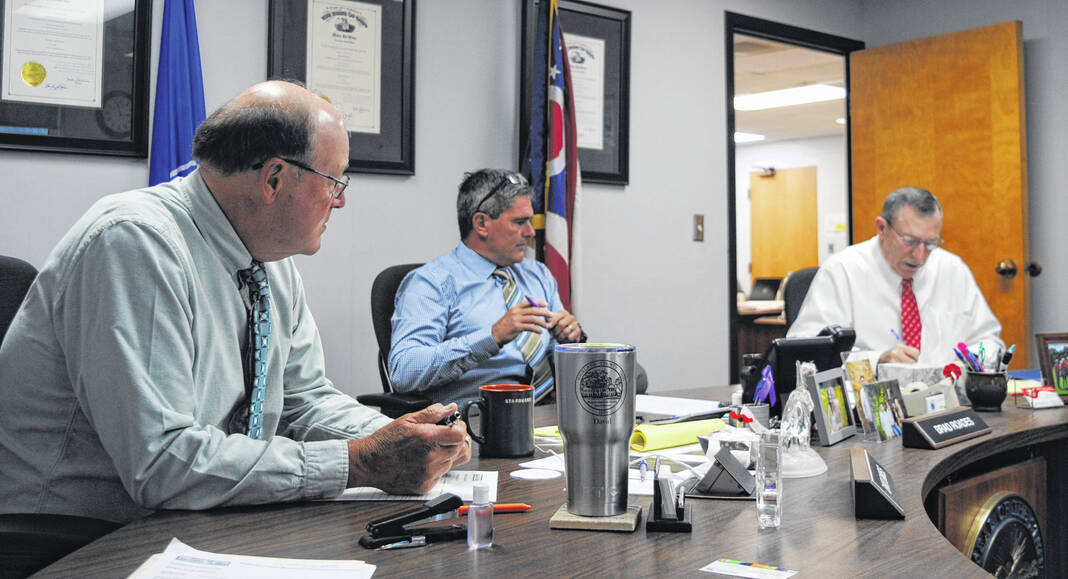
Highland County commissioners (l-r) David Daniels, Brad Roades and Terry Britton are pictured during their weekly Wednesday meeting.
Jacob Clary | The Times-Gazette
Multiple construction updates in Highland County were delivered by Nicole Oberrecht, the county’s American Rescue Plan Act (ARPA) funds coordinator, at the weekly Wednesday meeting of the Highland County Board of Commissioners.
Oberrecht said that originally the county planned on setting aside some of the ARPA money for upgrades on the Rolling Acres Wastewater Treatment Plant as a replacement for an upgrade of the sewer lines and manholes at Rolling Acres subdivision on Mad River Road. However, she said that would no longer be necessary thanks to funding from the Community Development Block Grant (CDBG) for critical infrastructure announced last week.
Oberrecht said the grant and part of the local revolving loan fund would be used to fully fund the upgrade, meaning none of the ARPA money would be needed.
“We were pretty excited to get that,” Oberrecht said.
She said the grant was worth around $416,000, with another $100,000 coming from the revolving loan fund.
With the new funding, Oberrecht said the first step would be an environmental review. Following the review’s conclusion, the project will go out for bid.
In other construction updates, she said the OSU Extension Building is “moving alone nicely,” with the footers and foundations walls poured. She said that in the coming week, the plumbers would come in.
Concerning the Rocky Fork Lake Wastewater upgrade project, Oberrecht said the first progress meeting was planned for next week.
For the Record Storage Center, she said the county is looking to finalize the contract documents “right now.” She said the documents are in the hands of McCarty Associates, with them trying to get them wrapped up and executed “pretty soon.”
Commissioner Dave Daniels said the ARPA money had a pledging deadline of December 2024 and a deadline for the money to be expended by December 2026.
In other news, commissioner Terry Britton said that the board received correspondence from Hecate Energy involving one of the solar pilot projects in Highland County. He said the board sent Hecate an invoice for its portion of the pilot program cost, to which the company responded. Britton said the board would need to look into the specific details and then talk to the state to find out “exactly” what’s going on.
“In my opinion, once you start putting energy into the grid, you’re operational… The pilot normally says that you have to pay whatever the face plate generation capacity is, whether it’s produced or not,” Daniels said. “They’ve already started putting amps into the grid. They should be paying.”
Oberrecht said the invoice was for $900,000. However, she also said it was similar to property tax bills, where it was $450,000 billed twice annually. She said the price was $9,000 per kilowatt on a 100-kilowatt facility.
Daniels also said he knew there had been communication between the Ohio Department of Development, the Ohio Department of Taxation and the Ohio Power Siting Board on the discussion of what constitutes a certificate of completion. He said the commissioners would need to make their opinions known to those organizations that Hecate was producing electricity.
On another matter, Britton said a control system running the HVAC, hot water heaters and all other aspects at the Highland County Justice Center was on its last legs. He said the system was around 20 years old and has a lot of issues. He said the county has had people rebuild it to get it back up and running. However, those people said that if went down again, it wouldn’t work anymore. Britton said the county is currently looking into replacing that system, with the replacement cost around $380,000. H also said the board planned to look at a grant through the state for $250,000 that would go toward the replacement.
Regarding Res. No. 23-161, Highland County Chief Deputy Brandon Stratton said it involved a completely new body camera program. He said the new program would be for five years for $110,000 and would consist of the company maintaining the cameras while also storing all of the digital evidence. Stratton said this latter aspect was why the last program didn’t work.
Concerning Contract 81, Jeremy Ratcliff, director of Highland County Jobs and Family Services (HCJFS), said it was in relation to the public health emergency rollback that’s been happening for around a year and a half. He said HCJFS has had some staffing issues that have held the organization back from processing the Medicaid cases in as timely a manner as the Ohio Department of Medicaid (ODOM) would like.
He said due to that, the organization reached out to the ODOM and the Jobs and Family Services Directors Association told HCJFS they would help them get the cases processed. Ratcliff said that’s where Washington County Jobs and Family Services comes in as it would help get some of those cases through.
He said the cases being processed were all from the COVID-19 public emergency, as nobody was allowed to be taken off Medicaid during the period. Ratcliff also said that it would involve going through all of the people on Medicaid during the pandemic and then determining if they’re still eligible, after which they’d stay on or be taken off.
Reach Jacob Clary at 937-402-2570.

